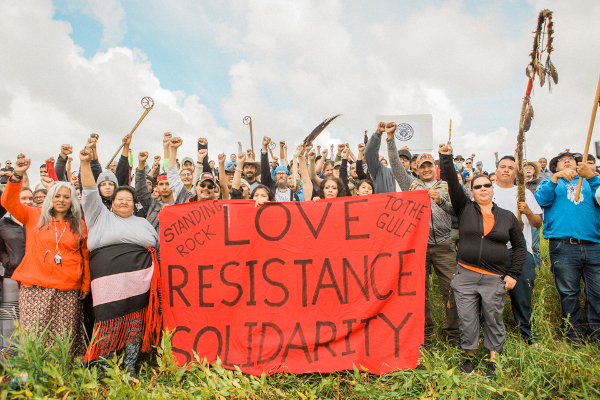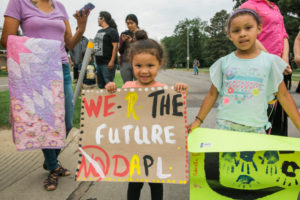
PHOTO/JOSUÉ RIVAS
Editor’s Note: Wesley Elliot, Haudenosaunee from Six Nations of the Grand River, did this interview for the People’s Tribune (excerpted for publication).
Wesley Elliot: It seems that the corporations and the government work together. How are you dealing with that?
Chairman Archambault: We’re just exposing that. The reason why there’s a merger is the way federal laws are created, and the way the federal laws that are in place infringe on indigenous rights, indigenous peoples. So, there’s a natural merger, saying this is legal, for a corporation to punch a pipeline underneath one of purest, cleanest bodies of water that are left in the United States. So the laws reinforce this merger and so we have to expose the wrong, and we have to expose how laws, no matter how legal it is, it is just wrong to infringe, to continue to infringe, on what is important and what is precious to indigenous peoples.
Wesley: Can you talk about the importance of water?
Chairman: So, we have a saying called mi-ni-wi-chon [phonetic spelling]. We have another saying mi-da-kya-se. What it means is that there’s a web of life, and everything in that web of life is related, and it has a spirit, has a na-vim, like a soul…Everything that has a spirit or a soul is occupying something that needs water, so we all need water, so water is life, and so water is not a resource, a subject or a matter, water is more than that, it’s like a relative, and when all things that have a connection, and are related – we’re related to the four legged, or the winged, or the ones that crawl or the ones that swim, or the ones that flower or the ones that grow – if you are related to them, you can communicate…But until that water is gone they will always be our relatives. So water is life for every thing.

PHOTO/JOSUÉ RIVAS
Wesley: Can you discuss the issues of poverty and oppression here in your territory?
Chairman: So, poverty exists. If you look at the ten poorest counties in this nation, two of them are here on this reservation, we straddle North Dakota and South Dakota. Five of the poorest counties are in the Great Plains. It’s not because of what we have done to ourselves it’s because of the oppression that has been put on us. It’s happened for 200 years.
It’s been the ramifications of federal policies – …taking of our resources, taking our land, taking – never protecting what is ours, taking our children, beating them when they spoke the language, giving us a piece of land, then saying you only get this much and we’re going to open it up for settlers. Flooding the Missouri River, that was once a river, now it’s a lake. Flooding our most pristine land, the land that bore the most fruit, the land that had the game, the land that had our shelter, the land that had the cottonwood trees, flooded and destroyed forever…When you’re in a state of oppression, a state of poverty, that is not your fault, it’s because of all the wrongdoings that have been done to your people, that created this state. When you’re in that state, it’s really hard to not think about yourself, because you’re struggling, you’re trying to survive for yourself. It creates individual interest. So you have to try get beyond that, and say, I’m not worried about myself any more, I’m worried about what’s going to happen in a hundred years, and what I do today, can that make a difference for those children and their children who aren’t even born yet, and are they going to have a world to live on.
Interview: Chairman Dave Archambault II of the Standing Rock Sioux
Latest
Free to republish but please credit the People's Tribune. Visit us at www.peoplestribune.org, email peoplestribune@gmail.com
The People’s Tribune brings you articles written by individuals or organizations, along with our own reporting. Bylined articles reflect the views of the authors. Unsigned articles reflect the views of the editorial board. Please credit the source when sharing: ©2024 peoplestribune.org. Please donate to help us keep bringing you voices of the movement. Click here. We’re all volunteer, no paid staff.

